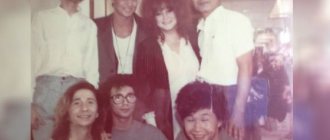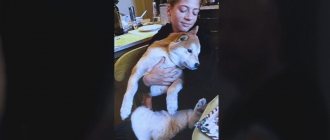The fate of Sergei Korzhukov, the first soloist of Lesopoval, was very difficult. And his life ended abruptly and unexpectedly. The biography and cause of death of Sergei Korzhukov are fraught with many mysteries and secrets. It is still not known for certain by whose will the tragic incident occurred: fate or the singer himself.
Korzhukov was an extraordinary person. Despite his talent, he always remained unsociable, shy, and until recently did not believe that he was worthy of fame and universal love. After the death of the lead singer, the Lesopoval group left the stage for some time.
Sergey Korzhukov - first soloist of Lesopoval
After all, the team managed to achieve such enormous popularity precisely thanks to Sergei Korzhukov.
Biography
Sergei Kuprik's voice cannot be confused with anyone else. It’s hard to imagine that Grigory Leps and Katya Ogonyok auditioned for the place of the lead singer of the Lesopoval group, but the audience associated the group with only two Sergei – Korzhukov and Kuprik. The first died tragically, and the second has long been leading a solo career, but at every concert the hits of the 90s “I’ll buy you a house”, “Let’s sit, boys”, “Mimosa Branch” are played without fail.
Discography
Main albums
- 1991 - “ I’ll Buy You a House
” 14 songs[4] - 1992 - “ When I come
” 13 songs[4] - 1993 - “ Thieves’ Law
” 14 songs[4] - 1995 — “ Amnesty
” 13 songs[4] - 1996 — “ Queen Margot
” 12 songs[4] - 1998 - “ 101st kilometer
” 12 songs - 2000 - “ Breadwinner
” 13 songs - 2001 - “ Personal Date
” 14 songs - 2002 - “ I’m from there
” 12 songs - 2003 - “ There is no market
” 12 songs - 2004 - “ Freedom, damn it!”
» 13 songs - 2005 — “ Vintorez
” 13 songs - 2006 - “ Smile, Russia!”
» 14 songs - 2007 - “ Mama - street
12 songs” - 2008 - “ Our Life
” 12 songs - 2010 - “ Look into my eyes
” 12 songs - 2013 — “ Flower-Freedom
” 12 songs
Collections
- 1996 - “ New line-up
” 14 songs[4] - 1996 - “ Best Songs (2 CD)
” 28 songs[4] - 1998 - “ Favorites
” 17 songs[4] - 1999 — “ Legends of Russian chanson
” 19 songs[4] - 2002 - “ Less Smoke
” 18 songs - 2002 - “ Grand Collection
” 20 songs
Concert recordings
- 1994 - “ Last concert with Sergei Korzhukov (2 CD)
” 22 songs[4] - 1995 — “ Logging in New York.
First walk » 13 songs[4] - 1997 — “ Logging in New York.
Second walk » 11 songs[4]
Magnetic albums
- 1991 - “ Songs of Vova-Mukha, a former child
” 16 songs
Vinyl
- 1992 - “ Stolypin carriage
” 10 songs - 1992 - “ Koresh
” 10 songs - 1992 - “ Video Salon
” 10 songs - 2014 - “I’ll buy you a house”
13 songs
Posts by Sergei Korzhukov
- 2002 - “ Unreleased
” 11 songs - 2007 - “ I stood at the threshold
” 17 songs - 2008 - “ Natalie
” 14 songs - 2013 - “ Sergey Korzhukov and the Lesopoval group - Last album
” 15 songs - 2013 - “ Mirages
” 22 songs
Childhood and youth
Sergei Kuprik is a Muscovite, born in 1973, on November 7, a holiday for Soviet citizens. He studied at school No. 626, where, in addition to general education subjects, much attention was paid to electives with theater specialization. Perhaps this affected the development of Kuprik’s creative talents.
Sergei Kuprik in childhood
In the yard, the boy was known as a hooligan and a bully, so his mother, in order to protect her son from the influence of the street, gave him a guitar. Sergei considered the instrument as a means to attract the attention of girls, but after graduating from school he entered the Gnessin School, the famous pop-jazz department, which graduated Valentina Legkostupova, Raisa Saed-Shah, Valeria, Katya Lel, Marina Khlebnikova. Kuprik still studies vocals with his first teacher, Associate Professor Natalya Andrianova.
History of the Lesopoval group
The work of "Lesopoval" evokes a variety of emotions - from complete delight to sharp hostility. Both of them can be understood. “Lesopoval” mainly sings about people who are, or have once been, in prison.
“Lesopoval” was created in 1992 by the famous poet Mikhail Tanich. After the war in 1947, he went to prison and spent 6 years in transit, camps and logging sites and was released from prison only in 1953 on the day of Stalin’s death. Hence the theme of the group's songs.
None of the other members of the group were in prison. All the stories told by “Lesopoval” were written by Tanich himself. This is not “blatnyak”, but, as Mikhail Isaevich himself says, “short stories about the camp”, “anti-blatnyak”. The main logging themes are that stealing is bad, but you can always end up in prison. The criminal codes of all countries are written in such a way that it is very easy to violate any article. The group sings not about how good it is to steal, but about how bad it is for people from the underworld
The Lesopoval group was born at the poet’s dacha in Asari. Tanich did not plan to create any group. But since he had to go through all the circles of hell - war, hospital, camp, rehabilitation, unemployment, hunger - he decided to tell something about himself. Tanich dictated two poems to Sergei Korzhukov, and two days later “this talented boy” already brought music.
Sergei Korzhukov (born 1958) was the first soloist and composer of the group.
He wrote music for more than 60 songs from Lesopoval. Korzhukov became so accustomed to his song image that his fans believed that he himself had been “on the other side of the barbed wire.” But that was not the case. It’s just that Sergei, more than anything else, was afraid that he would be accused of insincerity and, therefore, tried to make the song hero a part of himself.
He died tragically in July 1994, as the investigative version says - he fell from a 15th floor window in his mother’s apartment. It is believed that there was an accident, because there were no reasons for suicide, his career was going well, he was in demand, and one of the last books he read was a collection with the optimistic title “The Best Gift is Life.”
After the death of Sergei Korzhukov, the group practically ceased to exist. But Mikhail Tanich was literally inundated with letters with requests to re-establish the group, and in 1995, with the arrival of new musicians, Lesopoval was revived.
The main distinguishing feature of the group is professionalism. At the group’s concerts, the halls are always packed, and live the voice of the current lead singer of the group, Sergei Kuprik, always high-quality arrangements and “robber” dances look much better than on television. The musicians have a sense of proportion and at concerts they always “dilute” “camp” songs with lyrical ones.
There is one pattern - “Lesopoval” is greeted with caution, but by the end of the concert the audience will forever become their friends and fans. The members of the group are normal young guys, not devoid of intelligence, and all with musical education. “... There was a time when people were afraid to come to our concerts - they say, if you bring children, what will they learn there... Although for some reason they are not afraid to take children, for example, to Shura concerts... Of course, there is something to learn there!” - the opinion of “Lesopoval”.
And one more thing - during concerts in the hall, as a rule, there are a lot of police, and not “classic” bandits, although the group often performs in the zone. The “logger” “went” to the camps fifty times, but without Tanich. Tanich never entered the zone again - the memories are too bad.
Once after a concert, the musicians did a desperate act - they agreed to give autographs to everyone (and there were a lot of police officers in the hall) and fulfilled their promise, signing almost every third spectator, and left one police captain’s autograph right on his ID.
Musicians in their interviews always emphasize that they do not support the chaos that is happening now in the country and in business, and in politics, and on the stage, and with their songs they try to somehow restrain it, to support normal people and in the police, and in the colonies.
Composition of the group
Tanich Mikhail Isaevich.
Born on September 15, 1923 in Taganrog. The father was repressed in 1938. Mikhail received his school certificate on June 22, 1941, and in 1942 he was drafted into the ranks of the active army and fought on the fronts of the Great Patriotic War until 1945. Awarded the Order of Glory, III degree, Red Star, and medals. After the end of the war, he lived in Rostov-on-Don, where he studied at the Civil Engineering Institute. But... In 1947, he ended up in the same prison as his father and spent 6 years in transit, camps, and logging sites. Released from prison in 1953. He began publishing in the 50s and is the author of 15 books.
He worked with all famous Soviet composers (Frenkel, Shainsky, Feltsman, Saulsky, Solovyov-Sedoy, Bogoslovsky, Nikolaev) and leading pop artists (Pugacheva, Kobzon, Magomayev, Piekha, Khil, Leontyev, Dolina, Apina, Vaikule). His songs became popular hits - “Black Cat”, “How good it is to be a general”, “A soldier is walking through the city”, “Komarovo”, “Knots”, “Weather in the House” and the entire repertoire of “Lesopoval” (which is more than 100 songs ) - all this was written by the poet Mikhail Tanich.
Mikhail Tanich about himself: “In general, I am a person of quiet passions. I'm not a passionate lover. I don't do physical exercises. I read books, I prefer memoirs, I adore periodicals. I even joked once that I had changed my orientation – I used to love women, and now I loved newspapers.”
Fedorkov Alexander
Born in 1963 in Moscow, he graduated from a music school in trumpet class and the variety department of a music school, after which he served in the Song and Dance Ensemble of the Internal Troops. He worked in the Moscow and Kurgan regional philharmonic societies, Mosconcert. For 2 years he was the musical director of Alexander Serov's group. Now he is the musical director of Lesopoval. Honored Artist of Russia.
Mikhail Tanich about Fedorkov: “Sasha plays the piano, trumpet, accordion, guitar. He comes from a wealthy family, and at the age of 20 he drove a BMW. And I only listened to “Lesopoval”. When he came to us, he worked for a long time in the sweater of the late Sergei Korzhukov - he treated the group with such reverence...”
Kuprik Sergey
Born on November 7, 1973 in Moscow. In 1989, he entered the Gnessin Music College in the pop department, majoring in guitar. Since 1994, lead singer of the Lesopoval group.
Volkov Stanislav
Born on February 16, 1964 in Podolsk. While serving in the army, he was the leader of a musical ensemble, and since 1984 he worked at the Palace of Culture of the Klinovsky Machine-Building Plant as a sound engineer, and then performed as part of the VIA Molodost. Since 1985 he worked in restaurants in Abkhazia and Moscow as a guitarist and singer. He has been a sound engineer and singer at Lesopoval since 1997.
Soloviev Vladimir
Born on October 6, 1953 in Antratsyt, Lugansk region. He studied at the choreographic school. He served in the song and dance ensemble of the Kyiv Military District. After the army he worked in many musical groups. Since 1992 he has been working at Lesopoval.
Smirnov Veniamin.
Born on March 2, 1965 in the Kirov region. He studied at the Cultural Education School and at the Moscow State Institute of Culture in the choreography department. After serving in the army, he performed in a military ensemble and at the same time studied at the institute. Then he worked in various musical groups. Since 1992 at Lesopoval.
https://www.stilnoe.fm
Music
Sergei came to Lesopoval on the recommendation of a Gnesinka teacher. At the audition he performed Alexander Rosenbaum’s song “Zoyka”. But the leader of the group, composer Mikhail Tanich, decided that the 16-year-old boy was too young for a group with the image of inveterate “sidekicks”.
Sergey Kuprik in the group “Lesopoval”
After Korzhukov’s death, Tanich called himself and invited the singer to become a member of the group. With Lesopoval, Sergei traveled to all corners of Russia, performed in concert halls and in prisons; the team with its distinctive original style was enthusiastically received abroad. Songs performed by Kuprik were included in almost two dozen albums. The band's videos are mostly concert recordings, but this in no way detracts from their merits in the eyes of fans.
When Mikhail Tanich died, the performer decided that there were no further prospects from now on, and left the group. I talked with the leader’s widow, Lydia Kozlova, and, according to Sergei, we parted peacefully and calmly. However, former colleagues Vyacheslav Velichkovsky and Stanislav Volkov did not think so. In their opinion, the soloist’s departure is a betrayal, but they wished him good luck in his solo performances.
Sergei Kuprik’s song “I’ll buy you a house” (“White Swan on the Pond”)
To this day, Sergei fondly remembers the “logging” page of his biography. But, he says, within the group, personal projects were prohibited, and the musician strove to sing what his soul was in, and not what was “brought down from above.”
At the beginning of his independent journey, Kuprik was overcome by doubts and even fear whether it would work out, whether he would find his own audience. His wife Katya helped, she quit her job on television and retrained as director Sergei. According to the woman, there was simply no other way out; she had to live on something. Ekaterina learned the basics of administration by watching the work of Lesopoval, and not everything she liked there.
Sergey Kuprik and Mikhail Tanich
Over time, Kuprik began collaborating with singer Vika Tsyganova’s husband, Vadim, composer Alexander Morozov, whose works are performed by Russian pop stars. In addition, the former director and arranger of Lesopoval, Alexander Fedorkov, later joined the creative community.
In 2012, the first album entitled “White Swan” appeared in Sergei’s personal discography. The presentation of the disc was timed to coincide with the 20th anniversary of the singer’s professional activity and a concert was held at the Moscow Variety Theater.
Sergei Kuprik’s song “Russia is my Motherland”
In 2015, Kuprik’s second solo album, “Russia – My Motherland,” was released. The album contains 12 songs of a patriotic nature, some of which were recorded with the Alexandrov Song and Dance Ensemble, also with that famous composition that later died in a plane crash.
“How Beautiful You Are” is Sergei’s last studio work so far; the album was released in 2020. Kuprik admits that he doesn’t write poetry himself, except when he picks out a melody on the guitar. And in composing words for music, no one has yet surpassed the genius of Mikhail Tanich.
Music career
The insightful Mikhail Tanich did not forget about the gifted Sergei Kuprik, who had a pleasant timbre of his voice, and invited him to a meeting “about one matter.” At first, Sergei did not even understand why the famous poet needed him, and when he received an offer of cooperation from Mikhail, he agreed without hesitation.
Sergei Kuprik became the lead singer of the Lesopoval group in 1994
In the winter of 1994, Sergei officially became the new lead singer of the Lesopoval group. Soon after long rehearsals, the newly-minted artist made his debut on stage - for the first time he performed with the group at the fashionable Moskovsky club in the center of the capital. The hit was complete - with the appearance of Kuprik, “Lesopoval” seemed to have found a second wind. The prison theme was very popular in the country at that time, and the group’s songs were often heard on Radio Chanson and at the annual Chanson of the Year concerts. Lesopoval and Sergei Kuprik - I will buy you a house For his creative services in 2004, Sergei Kuprik became an Honored Artist of Ukraine. In addition to concert tours and recorded albums, the artist could also boast of starring in films and television series. In 2007, Kuprik made his debut in the series “Reporters,” where he met Boris Shcherbakov and Stanislav Govorukhin. A little later he could be seen in the television series “Law and Order”. However, the musician decided not to waste his energy and do only what he loved - music, and did not act in films anymore.
“Lesopoval” was an excellent start for Sergei Kuprik
In 2008, Kuprik received a diploma in “Show Business Management”, as he really wanted to professionally understand the promotion of a group on the stage. A few months later, he barely survived the passing of Mikhail Tanich. The death of the group’s founder made Sergei think about the future - the figure of Tanich meant a lot to Lesopoval.
Soon, leaving behind 14 intense years with the group, Kuprik decided to go solo. Famous friends helped him in this - producer Vadim Tsyganov (husband of Vika Tsyganova), famous artist Alexander Fedorkov and composer Alexander Morozov.
Sergei Kuprik - White Swan In the fall of 2012, Sergei gave an anniversary concert “20 years on stage” at the Moscow Variety Theater, which was attended by many fans of his talent. In 2013, the singer pleased fans with the release of his first solo disc, “White Swan,” and in November 2014, Kuprik released his second album, “Russia – My Motherland.”
Personal life
Sergei’s first marriage was civil, and a son was born, who was given the rare name Neil. The performer admitted that his ardent paternal feelings never awakened in him. The young man lives with his mother in Latvia and also does not want to communicate with Kuprik’s family.
The singer met his second wife in America in 2006. Ekaterina is a journalist by first education and did an internship on television in the States. “Lesopoval” came on tour at that time, and the musicians were invited for an interview. Sergei was hooked by the girl because she had no idea what kind of group it was. Later, the couple exchanged phone numbers and started a long-distance romance.
Sergei Kuprik and his wife Ekaterina
By that time, Kuprik had built a luxurious house in the Moscow region and one day invited Katya to see how he lived. The journalist was no longer able to leave. Sergei and Ekaterina got married only in 2012, and only because they were tormented by calls from the registry office, where the lovers did not show up several times.
In addition, the unofficial position complicated professional life, because the performer’s contracts were concluded in the name of his wife, and the opposite party had questions about what relation a person who is a stranger from a legal point of view had to do with creativity.
Sergey Kuprik
The family, according to Kuprik, doesn’t even have a photo from the celebration, everything happened so quickly. We returned from concerts in the Far East, put stamps and went to celebrate in Montenegro, where Sergei has another house. And in Russia, the couple started a small farm in the form of a rat, 4 parrots, 3 dogs and 2 cats. The couple does not have any children together yet.
In his free time, Kuprik uses his skills as a joiner, carpenter and woodcarver. He keeps in shape by working out in the gym, at one time he even lost 28 kg, following Maya Plisetskaya’s advice “Don’t eat!” The musician's hobby is radio-controlled aircraft modeling.
Sergei’s personal life and creativity are illustrated with photographs published on Instagram, on the official website and group on VKontakte.
Musical style
The songs of "Lesopoval" place great emphasis on lyrical content, which is based on the narrative of freedom, labor camps, a life of crime, and sometimes other themes such as peace and love.[11] Mikhail Tanich said that the six years he spent in Soviet labor camps gave him the opportunity to study and experience all the sides and features of criminal life, and that his task was to find at least some positive traits in people associated with with the criminal world[11].
Mikhail Tanich was a political prisoner, but in his poems he also sympathized with other prisoners who were in prison for various crimes, including those who were undeservedly serving time or who were there for petty crimes. The group also has a lot of songs telling about people who have “departed” and broken with the criminal world. Tanich stated that chanson “bloomed wildly in Soviet times, when the whole country was in camps, when zones, barbed wire, security towers with guards and machine guns were everywhere.” Besides all this, he believed that in Russia everyone is to some extent connected with the camps and with a life of crime[12].
In his songs, Tanich often touches on topics from Soviet life, focusing them on people with a criminal past[12]. Some of his songs deal with Soviet-era political themes, often with a humorous twist. For example, the song “ Tax”
"tells about the tax on childlessness that existed during the USSR. Childless men from 20 to 50 years old and childless married women from 20 to 45 years old were required to contribute 6% of their salaries to the state. The hero of the song mourns this, he is forced to pay this tax while sitting in prison, and the prison guards also refuse to provide him with a woman to conceive a child.
The group's songs often include slang, jargon, and criminal expressions, which, as Sergei Korzhukov said, are necessary to more accurately represent criminal life in Russia[13].
In music, the group relies on the style of Russian bard (author's) song, which is characterized by strong vocals with guitar accompaniment. Musicians combine these traditions with the use of accordion, synthesizer and drums[12].
Criticism
At the same time, government officials condemn the work of groups singing in the style of Russian chanson. In particular, the Prosecutor General of the Russian Federation Vladimir Ustinov called these songs “propaganda of a criminal subculture”[12].
The famous singer-songwriter and one of the brightest representatives of the “Russian chanson” genre, Alexander Novikov, who served 6 years in prison, talking about the genre, cited as an example the song of the group “101st Kilometer”[14]:
If I sing about prison, these are very bitter and very sad songs. Prison is not such a sweet thing to jump around arm in arm with Pugacheva and sing “One hundred and first, one hundred and first!” Drop anchors! And there, beyond 101, there are camps again.” Pandemonium!
The famous critic Artemy Troitsky gave the following characteristics of the “Russian chanson” genre[15]:
The only variety of our “chanson” to which I am openly allergic is thrifted pop music. For me, the symbol of this music is the Lesopoval group. I can’t imagine anything worse than the Lesopoval group.
Sergey Kuprik now
The work of Sergei Kuprik is appreciated at the state level - in March 2020, the singer was awarded the title of Honored Artist of Russia. The news caught the performer during a tour of the Urals and Siberia, before which he toured New Zealand and Australia.
Sergey Kuprik in 2018
In the fall of the same year, Sergei, whose work schedule included hundreds of points on several continents, visited Novaya Zemlya for the first time. The musician came to the harsh northern archipelago at the invitation of the Russian Ministry of Defense to give a concert for military personnel. The security department noted the Kupriks’ contribution to supporting the Russian contingent in Syria by awarding them medals for participants in the military operation in this Arab country.
Sergei Kuprik speaks to military personnel
In addition, Sergey participated in celebrations dedicated to Moscow Day, the festival “Ehh, Razgulay!”, held by Radio Chanson.
The popular performer plans to spend the winter and spring of 2019 on a concert tour dedicated to two significant events - his own 45th anniversary and the 25th anniversary of his stage activity.
Lesopoval group now
The group's discography includes 21 albums. And this is not the final figure. The team continues its history and remains a well-known and sought-after chanson group.
2020 marks the 95th anniversary of the birth of Mikhail Isaevich Tanich. And now the group’s tour is dedicated to this date.
Lesopoval group and Lydia Kozlova in 2020
On the official website there is a poster scheduled for months in advance: the group performs both solo and as part of combined concerts of Russian chanson stars. Latest photos from the performances are available on the official Instagram profile.
Paramedic in a restaurant
Sergei Vladimirovich Korzhukov was born in 1959 in Moscow. There, in the capital, after graduating from school, Sergei entered medical school. According to Maxim Kravchinsky, author of the publication “Legends and Stars of Chanson: from Vertinsky to Shufutinsky,” Korzhukov got married for the first time during his student years. His chosen one was classmate Natalya. Soon the newly-made family was replenished: the musician’s only son, Artem, was born. However, the child could not save the early marriage. Sergei and Natalya broke up even before receiving their diplomas.
Apparently, then Korzhukov did not even think about a pop career, because, after graduating from college, he immediately became a paramedic at an emergency medical service station. However, Sergei was always partial to music: he learned to play the guitar at the age of 11 and since then has rarely parted with the instrument. In the end, the craving for a true calling overpowered, and Korzhukov quit his previous job. But the inexperienced singer had nowhere to go: for 12 years, Sergei had to be content with visitors to the Hermitage restaurant.










